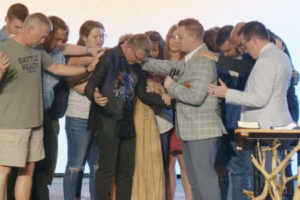In recent years, many countries have enacted laws aimed at the reduction of pollution and improvement in environmental quality. However, national policies, legal restrictions and international treaties seldom have meaningful impact without the active participation of the governed. And their participation, in turn, is largely dependent on their worldview: their fundamental beliefs about what is right and true, and the way things ought to be.
Unfortunately, not all worldviews place the same value upon the appreciation for, and protection of, the environment. A case in point is the worldview I took for granted during the early part of my life. That worldview—the one dominant in my culture (India)—is pantheism, in which nature itself is seen to be part of god. Every element of nature, therefore, including plants and animals, is considered to be a potential object of worship.
One might think that such a worldview should oblige its adherents to treat nature with dignity and respect. But pantheism is ambiguous at best with regard to environmental protection. Most of its rule books or religious guidelines were developed in a period that experienced very little environmental stress from development. Furthermore, the pantheistic worldview sees no fundamental distinction between mankind and nature, and no reason to treat either with particular respect.
The status quo in India is popular disrespect for the environment. Despite the government’s efforts to reduce pollution through a nationwide sanitation program, the people continue to litter everywhere and pollute our bodies of water. And there is very little enforcement of regulations.
My neighbor dumps his garbage right in front of our street. The bushy dump area is now infested with rat colonies, which are a persistent trouble to nearby residents.
Even the road in front of the café in which I am writing this article is littered with garbage. There are efforts by the local government in my city to clear the garbage, but it keeps reappearing at the same spots within a day or two.
Almost all the train stations of the metropolitan cities that I have visited in the past three years reek with the uncomfortable stench of urine emanating from their walls and entrances. It seems that no amount of reform, legal enforcement and economic development can stop the people of my country from littering and abusing the environment around them.
They need a different worldview.
The problem with the pantheistic and naturalistic worldview is that it does not have any basis to justify penalizing people for abusing their environment. Pantheism erases the distinction between man and nature, while naturalism approves and legitimizes environmental abuse on the basis of the evolutionary principle “survival of the fittest.”
Strangely, people around the world are increasingly subscribing to naturalism without understanding the environmental problems it has caused in the societies where this worldview is common.
In stark contrast, the Judeo-Christian worldview (in its orthodox form) is remarkably clear and beneficial on issues related to environmental care. In this worldview, humans (men and women) are seen as created in the image of God and having certain privileges and responsibilities pertaining to their status. Among the privileges is permission to use plants, animals and resources for their own benefit, but also with the responsibility to do so in ways that steward the environment, promoting its long-term health.
Nations that were built on these ideals have very strong laws prohibiting the abuse of nature and its creatures. Not all the adherents of the Judeo-Christian worldview discharge their environmental duties flawlessly. But the best strides toward environmental stewardship have been made within the Judeo-Christian framework.
This worldview has also had a strong and beneficial impact beyond the borders of the developed Western nations. It is now influencing the emergence of strict environmental laws throughout the pantheism-and-naturalism-dominated developing nations of Asia.
In India, for example, the common law legal system is based largely upon the British legal system, which, in turn, is a product of the Judeo-Christian worldview. Environmental laws in these legal systems thus bear the hallmarks of the Judeo-Christian worldview in their attempts to promote human well-being while protecting the environment.
Not all worldviews are equally friendly to the environment. It is because of this that I am on a mission—a mission to help people understand that their desire to contribute to the well-being of the environment is best met in the Judeo-Christian worldview. Hopefully, people’s worldviews in developing nations will change in the coming decades, and they will value nature and respect shared public spaces as they begin to love their neighbors as they love themselves.
Vijay Jayaraj (M.Sc., Environmental Science, University of East Anglia, England), research associate for developing countries for the Cornwall Alliance for the Stewardship of Creation, lives in Bangalore, India.
See an error in this article?
To contact us or to submit an article



















